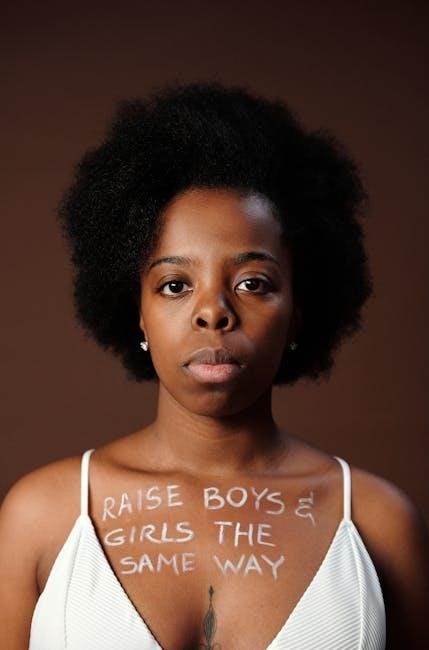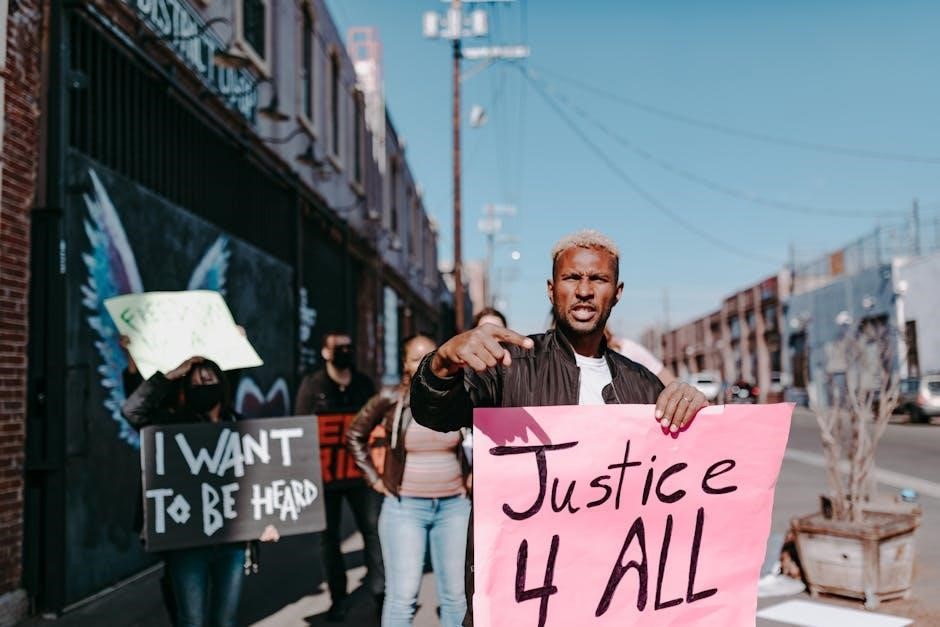Chimamanda Ngozi Adichie’s essay, based on her TEDx Talk, advocates for a broader, inclusive feminism, challenging stereotypes and promoting equity across genders through personal anecdotes and cultural insights.
Overview of the Book and Its Significance
We Should All Be Feminists is a powerful essay by Chimamanda Ngozi Adichie, adapted from her TEDx Talk. It advocates for a modern, inclusive definition of feminism, addressing gender inequality and societal expectations. The book is celebrated for its accessibility and impact, sparking global conversations about equality. Its significance lies in its ability to resonate across cultures, making it a vital resource for understanding feminism in the 21st century and inspiring change worldwide.
The Importance of Feminism in the 21st Century
Feminism remains vital in addressing persistent gender inequality and promoting equity. It challenges stereotypes, advocates for inclusivity, and empowers individuals to question societal norms. By fostering dialogue on gender roles and systemic biases, feminism encourages a more equitable society. Its relevance today lies in its ability to address issues like workplace discrimination, reproductive rights, and the limitations imposed on both men and women by traditional expectations, ensuring a fairer future for all.
Author Background: Chimamanda Ngozi Adichie
Chimamanda Ngozi Adichie, a renowned Nigerian novelist, has works translated into 30 languages. Her writing spans novels like Purple Hibiscus and Americanah, exploring cultural and gender themes.

Biography and Literary Contributions
Chimamanda Ngozi Adichie, born in Nigeria, is a celebrated author whose works span novels, essays, and speeches. Her writing, translated into 30 languages, includes Purple Hibiscus, Americanah, and Half of a Yellow Sun. Adichie’s TEDx Talk, We Should All Be Feminists, became a global phenomenon, inspiring conversations on gender equality. Her literary contributions have earned her numerous awards, solidifying her role as a leading voice in contemporary literature and feminist advocacy.
Her Role as a Feminist Advocate
Chimamanda Ngozi Adichie is a prominent feminist advocate, using her platform to challenge gender stereotypes and promote equality. Her TEDx Talk, We Should All Be Feminists, has become a rallying cry for global gender equality. Adichie emphasizes the need for inclusive feminism, addressing how patriarchy affects both men and women. Her advocacy extends beyond literature, influencing cultural and social change, and inspiring a new generation to embrace feminism as a collective movement for human rights.
Key Themes in “We Should All Be Feminists”
Adichie explores gender inequality, the role of language in shaping perceptions, and personal anecdotes to highlight cultural biases, advocating for a more inclusive understanding of feminism.
Gender Inequality and Its Pervasive Nature
Adichie highlights how gender inequality is deeply ingrained in cultural norms, affecting both men and women. She illustrates how societal expectations restrict opportunities, perpetuating disparities in education, employment, and personal freedoms. By sharing personal experiences, she reveals how girls are taught to limit their ambitions, while boys are pressured to conform to rigid masculine ideals. This pervasive inequality, often normalized, underscores the urgent need for a collective effort to challenge and dismantle these systemic barriers.
The Role of Language in Shaping Gender Perceptions
Language plays a crucial role in shaping gender perceptions, often perpetuating stereotypes and inequality. Adichie emphasizes how words and expressions can demean women or reinforce rigid gender roles. For instance, terms like “feminine” or “masculine” often carry implicit biases, influencing how individuals perceive themselves and others. By examining language, Adichie advocates for awareness and change, urging society to adopt inclusive terminology that challenges these ingrained perceptions and fosters equality.
Personal Anecdotes and Cultural Analysis
Adichie interweaves personal experiences with cultural critique, illustrating how gender norms shape lives. She recalls being labeled “feminist” as a teenager, a term initially seen as an insult. Drawing from Nigerian culture, she examines practices like limiting girls’ ambitions to avoid threatening men. These anecdotes highlight systemic gender inequality, offering a relatable lens through which to view broader societal issues and the need for change.

The Concept of Feminism Today
Adichie redefines feminism as a movement for equity and inclusivity, emphasizing the need to challenge stereotypes and promote equality for all genders in modern society.
Redefined Feminism for Modern Society
Chimamanda Ngozi Adichie’s work redefines feminism for the 21st century, advocating for equity and inclusivity across all genders. She emphasizes the importance of challenging stereotypes and promoting equality, ensuring feminism addresses the diverse experiences of individuals globally. By sharing personal anecdotes and cultural insights, Adichie broadens the definition of feminism, making it accessible and relevant to modern society. Her approach encourages collective effort to create a more equitable world for everyone.

Equity and Inclusivity Across Genders
Chimamanda Ngozi Adichie emphasizes the importance of equity and inclusivity across genders, advocating for a society where both men and women can thrive without restrictive gender roles. She argues that true equality involves challenging stereotypes and ensuring equal opportunities for all. By redefining gender roles and promoting mutual respect, Adichie’s vision of feminism fosters a more inclusive and equitable world, benefiting both genders and breaking down societal barriers that limit human potential.
Impact of Gender Socialization
Gender socialization restricts both boys and girls, teaching girls to be likable and boys to suppress vulnerability, perpetuating inequality and limiting personal growth and societal progress equally.
Teaching Girls and Boys: Limitations and Expectations
Adichie highlights how societal expectations restrict both genders, teaching girls to be likable but not overly ambitious, while boys are discouraged from showing vulnerability. These limitations perpetuate inequality, as girls are conditioned to avoid threatening men, and boys are denied emotional expression. Such narrow roles hinder personal growth and societal progress, reinforcing gender-based constraints that stifle potential and maintain unequal power dynamics across generations.

The Effects of Patriarchy on Both Genders
Adichie emphasizes that patriarchy harms both genders by enforcing rigid roles. Girls are taught to prioritize likability over ambition, while boys are discouraged from expressing vulnerability. These limitations perpetuate inequality, as girls are restricted from achieving their full potential, and boys are denied emotional depth. Such societal norms stifle personal growth and reinforce harmful gender stereotypes, ultimately affecting everyone’s ability to thrive in a balanced and equitable society.

Systemic Gender Inequality
Systemic gender inequality is deeply rooted in cultural norms and societal structures, limiting opportunities and perpetuating stereotypes that affect both men and women, hindering societal progress.
Examples from Nigerian Culture and Beyond
Adichie highlights systemic gender inequality through Nigerian cultural examples, such as the historical killing of twins and restrictive gender roles. She notes how girls are taught to limit their ambitions to avoid threatening men, while boys are conditioned to suppress emotions. These practices perpetuate inequality, reinforcing harmful stereotypes globally. Adichie emphasizes that cultural norms, though deeply ingrained, can evolve, advocating for a shift toward gender equity and challenging societal expectations that stifle individual potential and perpetuate injustice.
Historical and Contemporary Perspectives
Adichie examines the historical roots of gender inequality, tracing its evolution into modern society. She reflects on how cultural norms, such as the once-common practice of killing twins in Nigerian Igbo culture, have shifted over time. Adichie connects these historical injustices to contemporary issues, like workplace discrimination and societal expectations, emphasizing that understanding the past is crucial for addressing present inequalities and fostering a more equitable future for all genders.
The Power of Personal Stories
Adichie’s personal stories illustrate broader feminist issues, making the movement relatable and impactful. Her anecdotes humanize the struggle, inspiring collective action for gender equality.
Adichie’s Personal Experiences with Gender Bias
Adichie shares personal anecdotes, such as being labeled a feminist by her friend Okuloma, reflecting her early encounters with gender bias. Growing up in Nigeria, she witnessed societal expectations limiting girls’ ambitions, shaping her feminist perspective. Her experiences highlight how cultural norms restrict women, inspiring her advocacy for gender equality and challenging patriarchal systems through her work.
Using Anecdotes to Illustrate Broader Issues
Adichie effectively uses personal anecdotes to highlight gender inequality, such as her friend labeling her a feminist, which sparked her advocacy. She shares stories of girls being taught to balance ambition without threatening men, illustrating societal constraints. These narratives bridge personal experiences with universal themes, making complex issues relatable and emphasizing the need for systemic change.

Challenging Stereotypes and Misconceptions
Adichie challenges stereotypes by addressing misconceptions about feminism, emphasizing its focus on gender equality and inclusivity rather than male blame or female superiority.
Addressing Common Misunderstandings of Feminism
Adichie clarifies that feminism is not about male blame or female superiority but about challenging gender roles and advocating for equality. She addresses misconceptions by emphasizing that feminism seeks to dismantle harmful stereotypes and promote inclusivity, benefiting both genders. Through personal experiences and cultural analysis, she illustrates how societal expectations limit individuals, urging a shift toward equity and collaboration. Her arguments redefine feminism as a movement for human rights, not gender warfare, fostering understanding and collective progress.
Breaking Down Cultural and Social Barriers
Adichie challenges cultural norms by sharing personal experiences and advocating for gender equality. She emphasizes that societal expectations often limit individuals, regardless of gender. By addressing these barriers, she promotes a shift in mindset, encouraging collaboration and mutual respect. Her work highlights the importance of diverse perspectives and inclusive dialogue, fostering a culture where gender roles are redefined to empower everyone. This approach helps break down stereotypes and fosters a more equitable society.
The Global Reception of the Book
Adichie’s work has received international acclaim, with her essay distributed in schools across Sweden and widely read globally, highlighting its universal relevance and impact on gender discussions.
International Acclaim and Recognition
Chimamanda Ngozi Adichie’s essay has garnered widespread international acclaim, with translations in over 30 languages. Its adaptation into an illustrated book and distribution in Swedish schools highlight its global impact; The TEDx Talk that inspired the essay went viral, sparking a worldwide conversation on feminism. The book’s universal themes and personal narratives have resonated across cultures, solidifying its status as a modern classic and a pivotal work in contemporary feminist discourse.
Adoption in Educational Systems Worldwide
Chimamanda Ngozi Adichie’s essay has been widely adopted in educational systems globally. In Sweden, it was distributed to high school students nationwide, fostering discussions on gender equality. Universities and schools worldwide incorporate the text into curricula, using it to teach feminism, gender studies, and cultural analysis. Its accessibility in PDF and online platforms like Perlego has further facilitated its adoption, making it a key resource for educating future generations on inclusive feminism and social change.

Critical Responses and Debates
Adichie’s essay sparked global debates, with supporters praising her inclusive feminism and critics arguing her views overlook certain cultural nuances, reflecting diverse perspectives on gender equality.
Support for Adichie’s Arguments
Adichie’s arguments have garnered widespread support for their clarity and relatability. Her emphasis on inclusivity and equity resonates globally, particularly her critique of patriarchal norms affecting both genders. Personal anecdotes and cultural insights make her case compelling, encouraging broader conversations about gender equality. Many praise her ability to redefine feminism for modern audiences, making it accessible and necessary for all. Her work has also been embraced in educational systems, further amplifying its impact and relevance.
Criticisms and Counterarguments
While Adichie’s essay is widely praised, some critics argue it oversimplifies complex gender issues. A few readers feel the book’s brevity limits its depth, while others question its universal applicability. Some hesitate to embrace feminism due to misconceptions or fear of backlash. Despite these critiques, the essay remains a powerful tool for sparking conversations about gender equality and challenging societal norms, emphasizing the need for ongoing dialogue and understanding.
The Role of Education in Promoting Equality
Education plays a vital role in challenging gender stereotypes and fostering equality, as highlighted in Adichie’s work, which is increasingly adopted in schools worldwide to empower future generations.
Teaching Feminism in Schools
Integrating feminist principles into school curricula fosters critical thinking about gender roles and equality. Adichie’s work, now widely adopted, encourages students to question societal norms and embrace inclusivity. By introducing these concepts early, education systems can dismantle stereotypes and prepare future generations to advocate for gender equity. This approach not only enriches students’ understanding of social dynamics but also empowers them to challenge and change oppressive systems. Schools play a pivotal role in nurturing informed, empathetic, and equitable thinkers.
Empowering Future Generations
By instilling feminist values in young minds, we cultivate a society that values equality and challenges gender-based limitations. Adichie’s essay, now distributed in schools worldwide, inspires youth to question outdated norms and strive for inclusivity. Empowering future generations means equipping them with the tools to dismantle systemic inequality and foster a world where everyone, regardless of gender, can thrive. This collective effort ensures that the fight for gender equity continues and evolves, creating a brighter, more just future for all.

Call to Action: Why Everyone Should Be a Feminist
Adichie urges collective action, emphasizing that feminism benefits everyone by dismantling gender-based barriers and fostering equity. Embracing feminism is essential for creating a fairer, more inclusive world.
The Necessity of Collective Effort
Adichie emphasizes that achieving gender equality requires a collective effort, where individuals from all backgrounds work together to challenge and dismantle oppressive systems. By fostering collaboration and unity, society can address deeply ingrained biases and create a more inclusive world. This shared responsibility ensures that no one is left behind, and everyone contributes to the ongoing fight for equity and justice.
Creating a More Equitable Society
Adichie’s vision for a more equitable society involves dismantling gender-based barriers and fostering opportunities for all individuals, regardless of gender. By challenging stereotypes and promoting inclusivity, we can create a world where everyone has the chance to thrive. This requires systemic changes and a cultural shift towards valuing diversity and equality, ensuring that future generations inherit a fairer and more just society.

Adichie’s work continues to inspire global conversations on gender equality, leaving a lasting impact by challenging societal norms and advocating for a more inclusive and equitable world.
Chimamanda Ngozi Adichie’s essay emphasizes the need for gender equality, challenging societal norms and stereotypes. She highlights the pervasive nature of gender inequality, the role of language in shaping perceptions, and the importance of personal stories in illustrating broader issues. Adichie advocates for a redefined feminism that promotes inclusivity and equity, urging collective effort to create a more equitable society. Her work has sparked global conversations, making it a pivotal text in modern feminist discourse and education.
The Ongoing Relevance of Adichie’s Message
Chimamanda Ngozi Adichie’s message remains timeless, addressing systemic gender inequality and the need for collective action. Her insights on intersectionality, cultural norms, and personal experiences continue to resonate globally. The essay’s adoption in educational systems and its adaptation into various formats highlight its enduring relevance. Adichie’s call for inclusivity and equity inspires ongoing conversations, making her work a vital resource for understanding and challenging gender issues in modern society.



